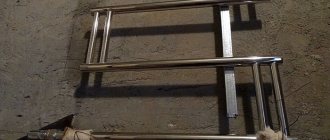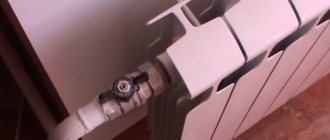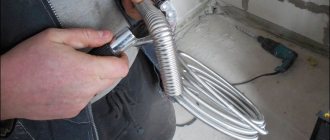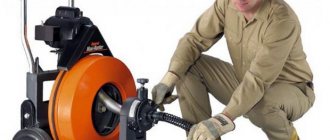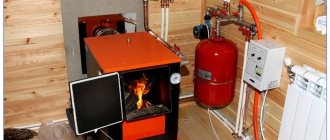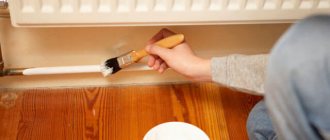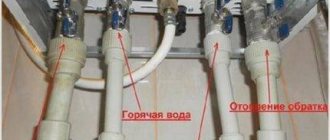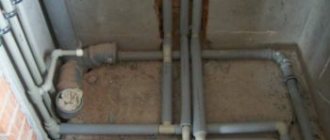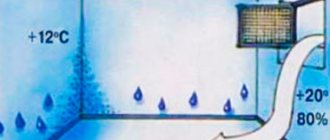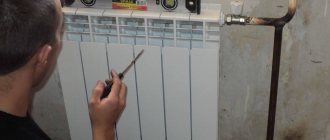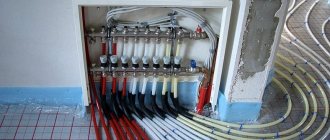Does noise from the battery interfere with your sleep?
Let's try to figure out why heating pipes make noise and how we can eliminate the causes of this noise.
Radiator and heating riser
The case when noise occurs in the heating pipes during normal operation of the system is not something exceptional; Almost everyone has probably encountered knocking or noise in risers.
Let's try to analyze the most common causes of noise of various kinds.
Causes of extraneous noise
Metal pipes and heating radiators are devices that often encounter extraneous sound during operation, since the material itself belongs to the group of loud products. Most often, extraneous sound occurs in rounded elements, since compressed pressure creates many sound inconveniences. Statistics show that excess noise levels can be exceeded several times in these places. The following are the main reasons for the appearance of extraneous noise:
- Water leakage from the piping system.
- Air jams are created.
- Parts of the heating system pipeline become clogged and cannot cope with the imposed loads.
- When parts of the heating system wear out.
- If installation technologies are violated, the quality of the system is disrupted.
- In case of deviation from the established standards within the framework of sound insulation of the pipeline.
- Non-compliance with technical standards of the material is another reason for the appearance of extraneous noise.
A polyphonic symphony in a heating system can be easily eliminated by using a special soundproofing material. Experts agreed that soundproofing batteries is the main opportunity in arranging the comfort of a room without extraneous sounds from highways.
Hissing and whistling
If the radiator hisses or whistles, this is a sign of a water leak. Moreover, the location of the leak can be anywhere in the heating system. Sometimes water comes out in a heating pipe embedded in the wall, and the sound comes from a radiator 10 meters away.
If you live in a multi-storey building and have not found an obvious leak in your apartment, talk to your neighbors. Maybe somewhere in a secluded corner they have already accumulated a puddle. If you can't find an obvious place, you should check:
- Parts of pipes embedded in ceilings and walls;
- Common riser;
- Places where the riser passes through the ceilings.
In a private home, also check all heating system equipment. From pumps to heat sources.
Flushing
The next scenario is flushing. If you hear a loud, uniform noise in your heating riser, if your radiators are noisy and this happens for several hours, perhaps one of your neighbors is simply flushing their radiator. In fact, flushing usually takes from 10 to 20 minutes, but most residents find that the longer the battery is flushed, the better it will perform in the future. Therefore, the noise may linger.
Battery during cleaning
Quite exotic cases also happen. It's probably worth mentioning this. When the residents warmed themselves in this way, the radiator stood on the return side and, accordingly, heated rather weakly. The apartment owners found a simple way out of the situation - they set the riser to discharge. They shut off the valve on their riser below, below the radiator, and connected a hose, directed it into the toilet and thus used the discharge battery. This did help them survive the extreme cold that year, but naturally all the neighbors in this case enjoyed the noise from the radiators.
Why do heating radiators make noise in a private house?
Batteries in a private home make noise for various reasons. The breakdown can be corrected only after it is known exactly why the radiators are noisy.
Overpressure
Radiator noises caused by excessive pressure inside the entire installation signal the danger of a breakthrough.
Technical communications are designed for a certain operating pressure, which is controlled using sensors - pressure gauges.
Based on the standard indicators set for a specific circuit of heating systems, you can adjust the pressure pumped by the pump yourself.
Incorrect installation of thermal valve
The home master does not see the difference which side to install the battery shut-off valve. But if the thermal valve is installed incorrectly, hot water pressure occurs on the valve, causing noise. Such a tap may tap periodically.
Pump noise in the boiler room
In the past, it was common practice to locate pumping equipment in a separate building to reduce the volume of sound it produced. Modern pumps are located in the basement of private houses.
Their work has been improved to such an extent that maximum efficient use of the heating circuit is possible with minimal hearing discomfort.
Photo 1. Pumps in a boiler room located in a semi-basement room can cause vibration and noise from radiators.
But incorrectly selected pump power for a particular house is reflected in the appearance of constant noise from radiators and pipes. Metal communications perfectly transmit the vibrations of a powerful supercharger throughout a private home.
Attention! To prevent this effect, you need to adjust (reduce) the power of the pump, and before installing it, coordinate its performance with specialists
Incorrect boiler operation
Monitoring the correct functioning of the device eliminates the hassle of battery operation and failure. The first sign of a boiler malfunction is the appearance of extraneous sounds.
To eliminate the defect, the modes of turning on and off the heating apparatus are adjusted.
The frequency of mode changes occurs once every 20–40 minutes. Good operating performance indicators are 75–80% of the boiler’s rated power.
A good solution to the problem is to install automatic room regulators that independently control the boiler power by measuring the temperature on a specific radiator.
Uneven supply pipes
When installing a system of “communicating vessels” in a private house, the laws of hydrostatics are strictly observed. All installation work is carried out using a level - a device that controls the parallelism and perpendicularity of the heating circuit elements to the level of the earth's surface. Pipes installed at an angle create an unnecessary difference in the water level, causing splashing inside them.
Battery displacement when heated
The radiator is attached to the wall using special brackets, which are made of metal with lower thermal conductivity than the batteries themselves.
This protects the stands from unnecessary heating, which reduces the temperature of the entire heating system of a private home.
The material of the brackets is subject to little thermal expansion.
And heating radiators are sensitive to changes in coolant temperature. A material with high thermal conductivity expands significantly when heated. The junctions of such different elements often crack and click.
Reference! To prevent contact of parts, the occurrence of noise and subsequent corrosion of the metal in these places of the battery, elastic gaskets are used. Rubber washers work best.
Change in coolant temperature
Malfunctions of the circuit system also occur due to a mismatch in the power of the heating unit.
The degree of heating in the battery is adjustable, but it is better to carefully select all elements of the heating system in advance.
If the boiler is designed for 2 kilowatts, and the total power of the radiators is 1 kilowatt, then this will periodically lead to malfunctions in the circuit, voltage in the pipes, and noise.
The material from which the batteries and pipes are made is also taken into account. Previously, cast iron was used, which withstood changes in the heating system.
Now other materials are common, less resistant to increased temperatures, although more attractive due to other characteristics.
And the neighbors are noisy too
More often than not, it's not just you and your family who suffer this. Therefore, you first need to go around the neighbors along the riser to identify the location of the noise.
Now, as for the nature of the buzz. Heating pipes, like water pipes, can emit single or rhythmic sounds, something like tap dancing, rustling, gurgling, or even generally vibrate and even hum – periodically or constantly. The reasons can be completely different, they are even classified into groups. But now we will not consider absolutely all of them, but will focus only on impact noise effects.
Note: The likelihood of noise in pipes is sharply reduced if you use metal-plastic or plastic pipes instead of metal and copper. This is explained by the high sensitivity of steel pipes to low-frequency vibrations and high rigidity. Although their material is much stronger. It is recommended to use ball valves rather than screw valves as shut-off valves, which are controlled by turning the handle. These are heavy cast copper products, not Chinese-made products made from light alloy material.
Let's look at each situation in more detail.
Different pipe diameters
If the pipes have different diameters, this may cause noise when the coolant moves. The problem is solved by installing pipes of the same section.
Excessive pressure in the heating system
Excessive pressure can cause noise in the radiator. To solve the problem, you need to adjust the pressure in the entire heating system. Owners of private houses can do this on their own; residents of apartment buildings will have to contact the building management. Typically, to regulate the pressure, install a washer on the elevator nozzle or install a regulator.
When the system is aired, a characteristic sound of bubbling water is heard. Residents of apartment buildings hear the same sound at the beginning of the heating season, when the radiators are filled with hot water. Air pockets are released using a Mayevsky tap.
Incorrect installation of thermal valve
The thermovalve is part of the temperature controller. If the thermal valve is not installed correctly, the fluid creates pressure on the valve and noise occurs. The thermal valve must be installed on the coolant supply, the flow area must be correctly adjusted (on valves with installation settings). There are situations when one of the residents has a thermostat installed, and the radiators are humming for all the neighbors in the riser.
Pump noise in the boiler room
If the pump power is selected incorrectly and it operates at the limit of its capabilities, or, conversely, with a large reserve of power, noise occurs. Noise can be transmitted over long distances through pipes. There are other possible causes of noise from the pump - malfunction, installation errors, lack of hydraulic compensators.
Incorrect boiler operation
If the boiler output is more or less than required, it may create noise. Normally, the boiler operating power should be from 75 to 80% of the rated power of the device. How can you tell if the boiler is working properly? The device should turn on and off once every 20-40 minutes. If the boiler turns on and off more often, most likely its operation is not regulated. Setting the boiler operating mode will solve the problem.
Uneven supply pipes
If the pipes are uneven, “gurgling” sounds may occur when the coolant moves. In this case, the problem can only be solved by replacing the liner.
Battery displacement when heated
The battery is hung on brackets. When heated, the metal expands, the batteries move along the bracket, and a cracking sound is heard. To eliminate the problem between contacting surfaces, you can use rubber spacers.
If debris gets into the battery, a characteristic cracking sound occurs. Flushing the heating system may be necessary to remove blockages.
Crackling or clicking of the batteries may be due to the fact that there has been a breakthrough in the heating main and the coolant is contaminated with mechanical particles.
Changes in coolant temperature
If the temperature of the coolant changes (first hot water flows, then cooled water), a knock may be heard due to the fact that the metal either expands or contracts due to the temperature difference.
At home you always want to immerse yourself in an atmosphere of comfort and tranquility. Various everyday troubles can significantly irritate a person who is tired after work or household chores, especially if the problem concerns noise. And if you can do something on your own with restless neighbors and the sound of cars passing on the street (ask them to be quieter, install high-quality double-glazed windows), then in the case of constantly noisy heating radiators, homeowners are lost and do not know how to fix the problem.
Most often, the noise of radiators in both apartment buildings and private houses haunts residents for several simple reasons - an incorrectly installed system or errors in its operation. Let's take a closer look at why heating radiators make noise in an apartment or house.
How to get rid of noise in heating radiators
How to solve noise problems
It often happens that the heating device becomes clogged from the inside.
In this case, pieces of slag will move along the radiator along with the flow of water, touching the walls. In this case, flushing will help. A hose is put on the faucet, and the water along with the debris is gradually drained.
Video:
If the procedure does not help, at the end of the heating season the radiator will have to be dismantled, disassembled and cleaned, or replaced.
An air lock in a heating device is a common cause of unpleasant gurgling sounds.
This problem is solved with the help of a Mayevsky crane, which will allow the air to be released and the battery to continue to operate silently.
Quite often, at the beginning of the heating season, problems with noise in pipes can arise due to pressure that is not fully equalized.
When the pressure difference in the pipeline exceeds 1.5 atmospheres, tapping may begin.
In this case, the specialist must install a washer in front of the regulator nozzle, which will equalize the pressure.
In an apartment building, a circulation pump is responsible for the movement of warm water through pipes and heating appliances in apartments.
If for some reason it starts to work incorrectly, then specialists must determine the solution: it may be necessary to install a special valve that will correct the operation of the pump, or it may even go as far as replacing the unit.
If the cause of the noise is identified in the place where the heating battery connects to the bracket, then you should think about replacing the brackets or choose a simpler method - place a rubber pad between the battery and the fastening element to prevent friction.
You can identify the leak yourself. To do this, just inspect the pipes in your apartment or house. If one can be seen with the naked eye, then this is good luck, and corrective measures can be taken immediately.
Having found out that everything is normal in the apartment, you need to go around the neighbors to look for the pipe from which water is leaking.
Video:
If your neighbors also do not find a leaking pipe, then it is necessary to inspect the main unit of the heating system.
In an apartment building, it is located in the basement, going down into which you can immediately come across steam - it is this that signals the location of the breakthrough.
In this case, the emergency service is immediately called.
As it turned out, there are various reasons for the unpleasant sounds emanating from radiators. But it will be easier to find out the reason now.
In most cases, it is better to solve the problem of eliminating noise according to the opinion of specialists, because they are guaranteed to have experience, knowledge, special tools and spare parts.
The main thing is not to hesitate, because this will help to avoid emergency situations in the future.
What sounds do batteries make?
Conventionally, the noise coming from the battery is divided according to the nature of the sound into knocking, humming, clicking, and gurgling.
The knocking sound comes from the battery as from the system element with the largest flat surface. In fact, the source of the sound is located elsewhere.
The main reason for knocking is uneven pressure in different sections of the pipeline.
Under high pressure, the coolant is supplied to the system, but, encountering narrowed fragments on its way, it tries to overcome them. This is where the knocking comes from.
The diameter of a pipeline section may decrease for several reasons:
- There is no bypass - a jumper connecting the inlet and outlet pipes in front of the battery. Many residents replace heating sections, inviting various craftsmen, or on their own. When replacing steel pipes with polypropylene, they do not always consider it necessary to install a bypass. A jumper can only be installed by redoing a new section.
- A shut-off valve of a smaller diameter has been installed or its working diameter has narrowed due to poor quality of hot water. When a shut-off valve is used to regulate the heating of a battery, a similar effect is achieved. In the simplest case, you need to open the tap completely. If this does not help, you should clean the gap in the tap or install a tap with a larger working diameter.
- There are air pockets in the battery. Excess air is released using the Mayevsky valve at the end of the battery.
- The problem lies in the heating radiator - a jet pump that increases pressure. Incorrect operation of the elevator can cause unstable coolant pressure throughout the entire circuit. The residents themselves cannot fix the problems in the elevator, and they do not have the right. The management company is responsible for maintaining the common heating units. A call to the dispatcher will help solve the problem.
Buzzing
A hum, sometimes similar to a whistle, can be caused by several reasons:
When water under pressure passes through the battery, turbulent turbulence is formed due to air bubbles. A sign of airiness is uneven heating of sections. Eliminated by removing air through the Mayevsky tap.
Photo 1. Mayevsky tap, which allows you to easily release excess air from the heating system.
- Too much pressure after the circulation pump in high-rise buildings, incorrect operation of the pressure regulator. Resolved by a mechanic of the management company.
- The increased vibration of the circulation pump is transmitted through the pipes to the apartments. This is again the fault of the management company employees, and it is up to them to fix the problem.
- Severe coolant leak in the heating circuit outside the apartment. If it is detected, you should contact the service organization.
- The hum is created by worn rubber gaskets in shut-off valves or couplings. Elimination of the defect is carried out at the expense of the residents, if the faucet is located in the apartment, or by an employee of the management company at the points where the common nodes of the heating circuit are connected.
We suggest you familiarize yourself with the Valve for bleeding air from the heating system: what types of vents there are on a heating radiator for automatic and manual air release, a drain valve, how to install an air vent
Clicks
After replacing the radiator, sometimes clicks are heard in the battery, similar to gunshots. The reason lies in the fact that the metal of the pipe and radiator has a different structure and a different coefficient of thermal expansion.
When the heating temperature changes, microdeformation of the connection of two metals occurs. This does not lead to the destruction of elements, but it does cause a lot of unpleasant sensations.
Reference. Even when using metals with the same thermal expansion, similar clicks can occur. These are the consequences of improper installation of heating system elements.
Deformation with temperature changes occurs in the transverse direction relative to the pipes or battery as a whole. When two riser pipes are placed too close to each other, almost touching, the deformation causes them to collide, accompanied by a clicking sound.
Murmuring
Photo 2. Dirt accumulation in batteries. Because of this, sounds appear in the heating system in the form of murmurs.
The defect can be eliminated only by completely replacing the coolant in the circuit while simultaneously cleaning the heating system. During the heating season, this process cannot be done due to its long duration. No one will allow the heating supply to be suspended in winter unless there is an emergency.
Attention! If you are not a specialist in heating systems, you should not interfere with their operation. Wrong actions can lead to serious problems
Expert advice on preventing unwanted sounds from appearing in the heating circuit
The likelihood of noise in heating pipes can be reduced by adhering to the following professional recommendations:
when welding polypropylene pipes, strictly observe the heating time of the parts being joined, since overheating leads to a decrease in the working clearance, and underheating leads to low reliability of the connection and a high probability of leakage; bend metal-plastic pipes using a pipe bender to avoid reducing the diameter of the pipeline in the bending section; heating circuit pipes must be equipped with heat and sound insulation; when welding metal electrically, you need to use only high-quality electrodes of the appropriate brand; at the highest points of the heating system and at the last devices of each branch, it is necessary to have Mayevsky valves for air release; valves and filters must be installed only in accordance with the specified flow direction; the pump power must correspond to that required for a particular system; To avoid airing, radiators should be installed strictly horizontally - using a bubble or laser level;
debris, welding drops, etc. entering the heating system pipeline
not acceptable; In order for the switched-on pump to make less noise during operation, it must be installed on vibration inserts and equipped with a sound-insulating casing; in autonomous heating systems, it is important to monitor the condition of the pumps, since the slightest malfunctions significantly increase the level of noise emanating from them; Changing the operating mode of the pump sometimes allows you to get rid of shocks and clicks; using only high-quality plumbing fixtures, fittings and auxiliary materials significantly reduces the risk of extraneous noise; It is necessary to periodically flush the system, preventing a decrease in the working clearance of the pipes due to various types of deposits and the associated appearance of unpleasant sounds.
How to improve system performance?
The comfortable sensations of apartment residents depend on how well the batteries are heated. If the heat is not enough, then there is a reason to think about how to increase the efficiency of the heating battery in the apartment.
These can be quite simple actions:
- Getting rid of air jams.
- Flushing radiators to clean them of scale, salts and dirt accumulated over years of operation.
- Removing dust from the battery.
- Installing a reflective screen, for which you can use ordinary foil, securing it behind the radiator. It’s even better if it’s a metal sheet or plate, since they will not only reflect the heat and prevent it from passing through the wall to the outside, but also, when they heat up themselves, will become an additional source of heat.
- Blowing air over a heating radiator in an apartment using a fan is a fairly popular and effective method of warming an apartment. Any device is suitable for this, the main thing is that it operates silently and consumes little energy.
These simple steps can significantly improve the operation of the system, but this can only be checked by knowing the standards for the heating radiators in the apartment.
In this case, we mean their heating level:
- for a two-pipe heating system it is +95 degrees (maximum values are indicated);
- with a single-pipe coolant supply - +115;
- The main indicator of heating batteries in apartments is considered to be +85-90 degrees.
You can measure the heating of radiators with a regular thermometer.
https://youtube.com/watch?v=6k3cqepD9yo
Murmuring, rustling. Gurgling, sound of water pouring in the battery
When such sounds appear, the reasons may be the following:
- The appearance of an air lock;
- Debris in the heating system;
- Bad gaskets.
Airing of the heating system is the most common problem with the appearance of extraneous sounds in the system. Air may appear due to poor quality water or coolant. This is especially true for aluminum radiators. Water with high acidity and alkalinity reacts with the metal and releases gas, which creates a plug.
The second reason for the appearance of air is poor-quality coolant. Over time, it can begin to break down and release oxygen or other gases (sometimes harmful to health).
It is not difficult to detect an air lock in the radiator. It is enough to touch it with your hand from above and below. If the top part of the battery is less heated, air or gas has accumulated there.
If a Mayevsky valve is installed on the batteries, bleed the air from each individual radiator. After that, wait 15-20 minutes and repeat the process. If there is no Mayevsky crane, the process will become more complicated. Read more about this in the article “How to properly bleed air from a heating battery with your own hands.”
Debris in batteries can appear for several reasons:
- Poorly purified water in the heating system;
- Decomposition of the coolant with the release of solid particles;
- Corrosion of the internal walls of radiators;
Small particles of rust and sand rub and hit the inner walls of the batteries, as a result of which an extraneous sound appears, such as rustling or rustling. The only way out is to flush the heating radiators.
Destruction of gaskets can occur due to:
- They are of low quality;
- Highly acidic waters;
- Aggressive coolant;
- Flushing the system with strong detergents.
In this case, the only option is to replace the gaskets. Moreover, they need to be changed not only at the inlet and outlet of the radiator pipes, but also between sections.
What leaks most often?
Fistulas primarily appear along the welded seams of electric-welded pipes. This is understandable. In all likelihood, you will not bother with this problem and contact the organization servicing your home to troubleshoot the problem. Some leaks can be fixed on your own. It is easy to tighten or fill the seal on a plug tap or valve yourself. How to do this - there are many videos and other manuals that talk about malfunctions of the corresponding taps and valves.
And another very common source of leakage is drain plugs. What actually happens and why do the plugs start leaking? A mechanic or one of the residents goes down to the basement to dump his riser in order to drain it. For example, to replace radiators, and then going down to the basement, he simply forgets to take the winding with him - plumbing flax, fum tape or something else. And accordingly, he screws in this long-suffering plug simply along the thread, tightening it with force. Steel is not a very ductile metal, and it is impossible to seal the connection in this way. The plug "whistles".
After some time, such fistulas usually become clogged, because the process water in the heating system contains a lot of suspended matter and silt. For some time, the plug will be a source of noise in the radiators and heating pipes. And naturally it will splash around, filling your basement with steam. Rewinding it is also easy. It is enough to close your riser together with the pair to it, in the case of lower filling, or at the upper filling, close one riser from below and from above in the attic, “give” the plug, wind it up and screw it in again.
Where can I complain?
Normally, pipes and batteries should not make noise. If the sounds are disturbing, you must first contact the house management company with a written complaint. If measures are not taken, you can complain sequentially to the following organizations:
- local body of the State Housing Inspectorate;
- local branch of Rospotrebnadzor;
- local authorities;
- prosecutor's office
If the owner of the living space entrusted the installation of the radiator not to the management company, but to other organizations, he must contact them. Problems may arise if there is no legal act of acceptance of work. In this case, the service of a heating engineer will be paid. In some cases, it is necessary to reconfigure the entire heating system.
If a defect is discovered in the radiator, and the certificate of acceptance of the radiator into operation issued by the organization that installed or replaced it has been preserved, and the warranty period has not yet expired, you can request that this organization carry out diagnostics and free repairs.
Sources of noise
Although extraneous sounds are most often heard from radiators, batteries are not the only sources of extraneous sounds. Possible places for noise to occur:
- supply pipes;
- heating risers;
- brackets and other fastenings;
- circulation pumps;
- heating boilers.
Pipes running from the risers to the radiators knock and click if they come into contact with other metal parts or the wall surface. If the bend radius of the pipe is incorrect, noise appears in it due to high pressure in the system.
Over the years of operation, risers accumulate deposits on the inner surface, reducing the effective diameter of the pipeline. This also causes noise in the pipes.
Brackets for mounting batteries and pipes should only support the structure. The attracting force creates additional deformation of the elements, hence the clicks.
In high-rise buildings, circulation pumps are used to increase the pressure in the circuit. Vibration due to incorrect installation of the pump motor is transmitted through pipes to the apartments. Excessive pressure due to improper adjustment of the pump causes noise.
The operation of heating boilers in centralized boiler houses does not cause trouble in the form of noise. Individual boilers located in apartments, in some cases, produce vibration sounds of boiling water or built-in pumps.
Types of noise in pipes
The noises that accompany the general heating start-up differ from emergency ones - they are intermittent and are accompanied by gurgling or gurgling. In bimetallic or aluminum batteries, a crackling or buzzing noise may be heard - this is also normal.
It is clear that prolonged noise is unpleasant, so it is necessary to prevent the situation in a timely manner.
The knocking and hum that occurs in the room with increasing force give reason to be wary and take drastic measures:
- Check heating devices and temperature conditions in the circuit. If a pump is installed, then its operation.
- Pay attention to the valves - if they break, a characteristic whistle appears. Sometimes a small adjustment is all it takes to get the equipment working.
- Having discovered visible problems, you need to stop the coolant and turn off the heating devices. Having assessed the breakdown, proceed to eliminate the accident yourself or invite a specialist.
These are primary measures that can prevent the development of major destruction.
Noise, hum, buzzing, extraneous sounds
There can be many reasons for constant noise in heating radiators. Let's look at them in order:
Wrong pipe diameter
Sometimes heating pipes are of different diameters and are connected by adapters. Because of this, a pressure drop occurs and turbulence appears in the water or coolant. They lead to vibration and extraneous sounds.
Often a change in diameter occurs due to clogged pipes. Sediments can accumulate on their inner walls. This results in reduced throughput.
The only way to solve the problem is to cut off the old pipes and install new ones.
Pressure drops
Due to pressure surges in the heating system, vibration may occur. The reason for this is uneven operation of the circulation pump.
If you live in an apartment building, you can install a bypass. It will help compensate for pressure changes. But it is best to contact the utility companies.
If you have your own heating system, perform diagnostics and maintenance of the circulation pump. And best of all, call a specialist. This can be done using the service for selecting private specialists PROFI.RU.
Flow rate
Some people incorrectly calculate the number of radiator sections. Because of this, it is cold in the house or apartment in winter. To compensate for this moment, you can increase the flow rate of water or coolant. But at the same time, unwanted vibrations will occur in the radiators.
Incorrect pipe laying
Many people hide heating pipes in the wall, but do it incorrectly. They simply lay them in a groove, and then cement or plaster them. As a result, the pipe remains rigidly fixed.
Due to heating and cooling, the diameter of the pipe changes. Cracks appear in the concrete and cavities form. They work as a resonator and amplify the sound of water or coolant flowing through the heating system. A hum or buzz appears, the source of which is difficult to detect.
The only solution to the problem is to open the pipes and lay them in soft thermal insulation (see photo). It compensates for expansion and also reduces heat loss.
Thermal insulation for heating pipes.
General wear and tear of systems
The reason for the appearance of extraneous sounds may be wear and tear on the heating system elements. Sources of noise can be faulty or broken:
- Fitting;
- Three-way valve;
- Coolant pressure regulator;
- Radiators;
- Circulation pump;
- Heat source (gas boiler, boiler, etc.).
It is important to remember that sound is transmitted very well through metal pipes. If your gas boiler is noisy, this will affect the volume of the entire system.
This option should also be taken into account.
Results
Self-diagnosis of the causes of noise in batteries is a troublesome task for the average person. It is difficult to accurately determine the causes of malfunctions , since the heating system of a private house is autonomous and closed. It is better to immediately contact specialists. They will quickly and accurately find the problem and fix it efficiently.
Good afternoon, my dear regular reader! Today I will look at the reasons why heating radiators make noise in an apartment and how to deal with it.
If you are the happy owner of your own apartment, then most likely you are also the owner of pipes and radiators connected to the centralized heating system of an apartment building. You are not involved in the boiler, fuel, installation and configuration of a complex engineering system.
Often apartments do not have thermostats, and sometimes even valves before and after the radiator. Pipes and radiators only need to be washed occasionally. It would seem that this is the least troublesome heating option. But what to do if the apartment is suddenly filled with unusual, not very loud, but ominous sounds that make it difficult to sleep?
